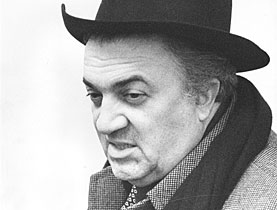
Keeping “Il Maestro” Fellini alive

The world's largest collection of archive material on Italian film director Federico Fellini is being created in Switzerland.
A private film foundation and the Swiss Film Archive – or Cinémathèque – have joined forces to preserve rare artefacts and films by Fellini, who made film classics such as La Dolce Vita, 8½ and La Strada.
The collection will contain some 24,000 original documents, letters, film scripts, photographs, drawings, posters, films, costumes and props.
Originals will be stored at the Cinémathèque’s new archive in Penthaz, near Lausanne, due to be completed in 2011. Copies will be kept at the Collège des Creusets secondary school in the town of Sion, home of the Fondation Fellini and film research centre.
The new joint collection will be available to film students, researchers and the general public.
“It’s an extremely important initiative as it allows us to create an overview of a genius who transcended cinema,” Foundation President Stéphane Marti told swissinfo. “Apart from his films, we have Fellini the painter, poet, writer and actor.”
The majority of the archive belonged to Swiss film producer Gérald Morin, honorary president of the film foundation.
Morin, who worked with Fellini from 1970-77 as private secretary and assistant director, spent 30 years collecting material on the Italian director.
“When I was 18 doing my baccalaureate exams [equivalent to A-levels] in France, I saw the film 8½. I then realised that I had to work in the film business and I started collecting everything to do with Fellini,” he explained.
Driven by his passion for film, Morin travelled to Rome to interview Fellini in 1971 and ended up staying and working on films from the director’s later period, such as Amarcord and Casanova.
“He used to pay his assistants in kind – a painting, sculpture or pen. He didn’t like to keep things so he gave them to me; he used to present me as his historian,” said Morin. “My wife became crazy as we had a 60m2 room full of boxes of his stuff.”
Wider audience
Returning to Switzerland in 1994, Morin, who has also worked with film directors Marcel Carné, Robert Altman, Francesco Rosi and Jean-Jacques Annaud, decided to make available his huge archive collection “so that Fellini can continue to live”.
“I didn’t want it to stay in a bunker and I wanted to make it available to students to get them interested in cinema,” he explained.
A chance meeting with Marti sealed their fate. Together, the film producer and French teacher started the foundation in July 2001. Morin later handed over some 13,000 original film documents on 100 different film directors, including 9,500 artefacts on Fellini.
As well as creating a film research centre and cinema club at the Collège des Creusets School, the foundation regularly organises exhibitions.
From July 17 the organisation will take a small part of the Fellini collection on the road to six cities in Poland, including Warsaw and Krakow, and is planning future exhibitions in France, Spain, Italy, Belgium and Switzerland.
In parallel to the creation of the Penthaz film archives, over time the foundation’s collection in Sion will be brought together with other “little-known” art collections from the region under the umbrella of a Valais cultural centre.
Dream-like world
So what was so special about Fellini, often described as the “directors’ director”, so famous he even has his own adjective?
“He’s unique; you can’t compare him,” said Morin. “He’s someone from a bourgeois provincial background who moved to Rome and entered the profession by chance, then slowly became completely self-taught.”
The maestro of 1960s neorealism is perhaps best known for his enduring images of voluptuous Anita Ekberg plunging into Rome’s Trevi Fountain in La Dolce Vita. But the film which became synonymous with 1960s decadence and gave rise to the term “paparazzi”, was only one of many by the Italian director.
“He went from neorealism to a kind of poetic neorealism to a very honest look on society,” said Morin.
In all, the influential film director made 23 films including Le Notti di Cabiria, Amarcord, Satyricon, 8½ and La Strada, which were widely acclaimed.
A unique combination of memory, dreams, fantasy and desire, Fellini’s films are deeply personal visions of society, often portraying people at their most bizarre. The term “Felliniesque” is used to describe any scene which blends reality and fantasy.
However, over time Fellini has suffered a crueller fate than other well-known directors from the same period. Some critics have dismissed his work as sentimental, overblown and self-indulgent, a filmmaker snared by his own intellectual and aesthetic pretentions.
“Fellini is still in the purgatory phase,” said Morin. “It’s normal with all big artists; he’s a bit of a dinosaur from a world that no longer exists.”
“He’s very personal…perhaps too personal. When I worked with him I didn’t learn how to make films, I learned how to live.”
swissinfo, Simon Bradley
Federico Fellini was born on January 20, 1920 in Rimini, Italy, and died on October 31, 1993 in Rome.
Before becoming a film director, he worked as a caricaturist and scriptwriter.
Fellini made his first film Luci del Varietà in 1950 and his last, La Voce della Luna in 1990. In all, he made 23 films.
Over his lifetime he won numerous awards including five Oscars for La Strada (1954), Le Notti di Cabiria (1957), 8½ (1963), Amarcord (1973) and a lifetime Oscar achievement (1993). He was also awarded the Palme d’Or at the Cannes Film Festival for La Dolce Vita (1960).

In compliance with the JTI standards
More: SWI swissinfo.ch certified by the Journalism Trust Initiative






























You can find an overview of ongoing debates with our journalists here . Please join us!
If you want to start a conversation about a topic raised in this article or want to report factual errors, email us at english@swissinfo.ch.